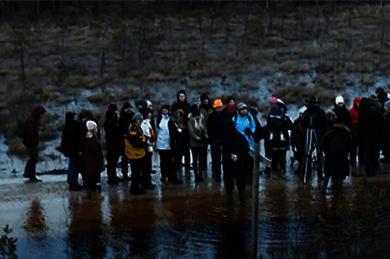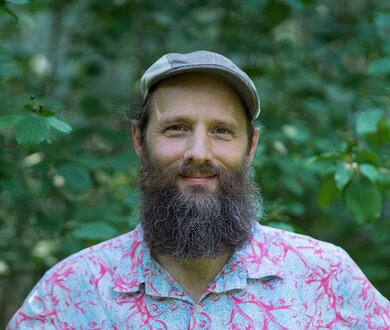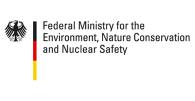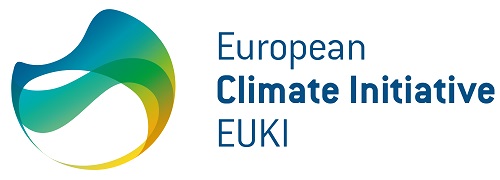EUKI – Paludiculture in the Baltic states
Potential and Capacities for climate protection through productive use of rewetted peatlands
The Baltic countries (Estonia, Latvia, and Lithuania) harbour 21,000 km2 of peatlands of which more than 50% are drained and degraded. They all rank in the EU’s Top 10 of greenhouse gas emitting countries from drained peatland (LV 5th, EST 8th, LT 9th). By rewetting of peatlands and introduction of climate-smart agriculture (paludiculture), substantial emissions can be avoided. Paludiculture gives a double mitigation effect by:
1) reducing land-based emissions as rewetting stops peat decomposition,
2) substituting fossil resources by renewable biomass.

EUKI - Paludiculture
Potential and Capacities for climate protection through productive use of rewetted peatlands.
Location: Estonia, Latvia and Lithuania
Duration: 10.2017-02.2020
To tackle the main obstacles for paludiculture the project envisages:
1) A feasibility study for using drained Baltic peatlands in paludiculture after rewetting to substitute fossil resources e.g. peat as horticultural substrates or reed as fuel on EU markets.
2) Stakeholder dialogue and capacity building on paludiculture practices, knowledge exchange within Europe;
3) Advocacy to adapt framework conditions for adapted use in national and EU policies.
Thus the project will identify and prioritise potential paludiculture sites in the Baltic states and recognise the potential of paludiculture for climate mitigation. It will also raise awareness of relevant stakeholders for options of and benefits from peatland rewetting beyond conversation and of/for paludiculture. It will build capacity to plan and implement paludiculture pilots on priority sites and to unlock new markets for products. There will also be recommendations for improved framework conditions for paludiculture. A multiple stakeholder dialogue is initialised.

Andreas Haberl
Expertise: Mire- & Paleoecology
Tel +49 3834 83542 15
Estonian website
Latvian website
Lithuanian website
Download site for project documents
Legal analyses:
Vahtrus, S. [&] Mannov, M. 2018: Paludiculture – opportunities and obstacles in Estonia. Analysis report, Estonian Environmental Law Center, 21 p. https://media.voog.com/0000/0037/1265/files/Legal%20analyses%20Estonia%20ENG.pdf;
in Estonian: https://media.voog.com/0000/0037/1265/files/Juriidiline%20anal%C3%BC%C3%BCs%20Eesti%20EE.pdf
Vahtrus, S. [&] Mannov, M. 2018: Synthesis for general conclusions and recommendations for improved legislatory and framework conditions for paludiculture in Baltics. Analysis summary report, Estonian Environmental Law Center, 7 p. https://media.voog.com/0000/0037/1265/files/Summary%20LegAnalyses%20ENF.pdf
Zemeckis, R. 2018: Legal analysis about national legislation and implementation paludiculture in Lithuania. Analysis report, Estonian Fund for Nature, 25 p. https://media.voog.com/0000/0037/1265/files/Legal%20analysis-report%20Lithuania%20FINAL%20ENG%207.10.2018-1.pdf
Ozola, I. 2018: Legal analysis about national legislation and implementation paludiculture in Latvia. Analysis report, Estonian Fund for Nature, 31 p. https://media.voog.com/0000/0037/1265/files/Legal%20study%20Latvia_ENG.pdf,
in Latvian: http://site-319632.mozfiles.com/files/319632/Legal_study_Latvia_2019_LV_FINAL.pdf?1587113983
Feasibility studies:
General (in English):
Haberl, A., Peters, J., Wichtmann, W., Salm, J.-O., Lotman, A., Piirimäe, K., Ozola, I., Stivrins, N.Ivanovs, J., Zableckis, N., Jarasius, L., Jarmalavičienė, K [&] Greimas, E. submitted: Implementation of Paludiculture in the Baltic States, Feasibility study report, Proceedings of the Greifswald Mire Centre XX/2020 (self-published, ISSN 0000‐000X), 106 p.
Submitted and in peer review process
Estonia (in Estonian):
Haberl, A., Peters, J., Salm, J.-O. [&] Wichtmann, W. (eds.) 2019: Teostatavusuuring. Märgalaviljeluse rakendamine Baltimaades. [Feasibility study paludiculture in the Baltic countries. In Estonian.]. Study report, Estonian Fund for Nature, Tartu, 83 p. https://media.voog.com/0000/0037/1265/files/Feasibility%20study%20EE%202020%2003.2020.pdf
Latvia (in Latvian):
Ozola, I., Haberl, A., Peters, J., Wichtmann, W. 2020: Priekšizpētes ziņojums Paludikultūru Ieviešana Baltijas Valstīs. [Feasibility study Paludiculture in the Baltic countries. In Latvian]. Study report, Lake and Peatland research Centre, Riga, 90 p. http://site-319632.mozfiles.com/files/319632/
Feasibility_Study_Full_Report_LV_2020_final.pdf?1587076150
Lithuania (in Lithuanian):
Zableckis, N., Jarašius, L., Sendžikaitė, J., Jarmalavičienė, K., Zemeckis, R., Haberl, A., Peters, J., Wichtmann, W., Salm, J.-O., Lotman, A., Piirimäe, K., Ozola, I., Strivins, N., Ivanovs, J. 2019: Galimybių studija "Pelkininkystė Baltijos Šalyse" [Feasibility study Paludiculture in the Baltic countries. In Lithuanian]. Study report, Lithuanian Fund for Nature, Vilnius, 30 p. http://glis.lt/file.php?id=1698
Policy briefs
Estonia (in Estonian):
Maakasutusest Pärineva Süsinikuheitme Vähendamine – Märgalaviljeluse Teostatavus Estis [Reduction of land-use based CO2 emissions – Feasibility of Paludiculture in Estonia] https://media.voog.com/0000/0037/1265/files/Turbaalad%20Euroopa%20Liidus.pdf
Latvia (in Latvian):
CO2 izmešu samazināšana, mainot zemes izmantošanas paradumus – iespēja paludikultūrām Latvijā [Reduction of land-use based CO2 emissions – Feasibility of Paludiculture in Latvia]
http://site-319632.mozfiles.com/files/319632/Policy_brief_LV_final_final.pdf?1587476420
Lithuania (in Lithuanian):
Pelkininkystės galimybės Lietuvoje: žemės naudojimu pagrįstas CO2 emisijų mažinimas [Reduction of land-use based CO2 emissions – Feasibility of Paludiculture in Lithuania] http://glis.lt/file.php?id=1692
GIS Analyses:
Estonian analysis report (in Estonian):
Piirimäe, K. 2019: Märgalaviljelus Eestis - GIS analüüs. [Paludiculture in Estonia – GIS analysis. In Estonian]. Project report, Estonian Fund for Nature, 34 p. https://media.voog.com/0000/0037/1265/files/GIS%20Anal%C3%BC%C3%BCs%20Lisa%201-1.pdf
General methodology and assessment approach in the three Baltic countries (in English):
Piirimäe, K., Salm, J.-O., Ivanovs, J., Stivrins, N., Greimas, E., Jarašius, L., Zableckis, N., [&] Haberl, A. 2020: Paludiculture in the Baltics - GIS Assessment report. Project report, Estonian Fund for Nature, 48 p. https://media.voog.com/0000/0037/1265/files/GIS_EE_LV_LT_04.2020.pdf
Various materials in Estonian:
Märgalaviljelust tutvustav voldik (Paludiculture flyer - in Estonian) http://media.voog.com/0000/0037/1265/files/82056_ELF_Margalade_voldik_k6-1.pdf
Heinsoo, K. [&] Melts, I. 2018: Eksperthinnang taastatud veerežiimiga turvasmuldadel erinevate liikide kasvatamise võimalustest. [Expert assessment of the possibilities of growing different species on peat soils with restored water regime. In Estonian]. Expert report, Estonian Fund for Nature, 9 p. http://media.voog.com/0000/0037/1265/files/Eksperthinnang-vahearuanne%20KHeinsoo%20IMelts%2022.10.2018-1.pdf
Ots, K. 2018: Eksperthinnang erinevate puuliikide kasvatamiseks ennistatud veerežiimiga turbaaladel Eesti ja Läti tingimustes. [Expert assessment for growing different tree species in peatlands with restored water regime under Estonian and Latvian site conditions.]. Expert report, Estonian Fund for Nature, 23 p. https://media.voog.com/0000/0037/1265/files/KOts%20Eksperthinnang.pdf
Heinsoo, K. [&] Melts, I. 2019: Märgalaviljeluseks sobivad kultuurid Eestis. [Plant species suitable for paludiculture in Estonia. In Estonian]. Expert report, Estonian Fund for Nature, 27 p. http://media.voog.com/0000/0037/1265/files/Heinsoo_Melts2019_Lisa3.pdf
Kaimre, P. 2019: Puistute kasvatamise tasuvusanalüüs jääksoos. [Cost-benefit analysis of stand cultivation in residual bog areas. In Estonian]. Expert report, Estonian Fund for Nature, 19 p. https://media.voog.com/0000/0037/1265/files/PKaimre2019_Lisa4.pdf
Salm, J.-O. [&] Kuresoo, L. 2019: Kokkuvõte õppereisist Soome juunis 2019 [Summary of the study trip to Finland in June 2019. In Estonian]. Project report, Estonian fund for Nature, 30 p. http://media.voog.com/0000/0037/1265/files/%C3%95ppereis%20Soome_kokkuv%C3%B5te.pdf
Partners in the project are: the Succow Foundation, the Estonian Fund for Nature (ELF), the Lithuanian Fund for Nature (LFN) and subcontractors after tendering in Latvia.
Political partners are: the Ministry of Environment of Estonia, the Ministry of Rural Affairs of Estonia, the Ministry of Environment of the Republic of Lithuania, the Ministry of Agriculture of the Republic of Lithuania, the Ministry of Environmental Protection and Regional Development in Latvia.




